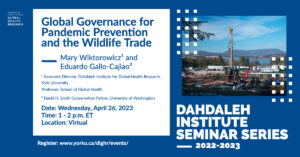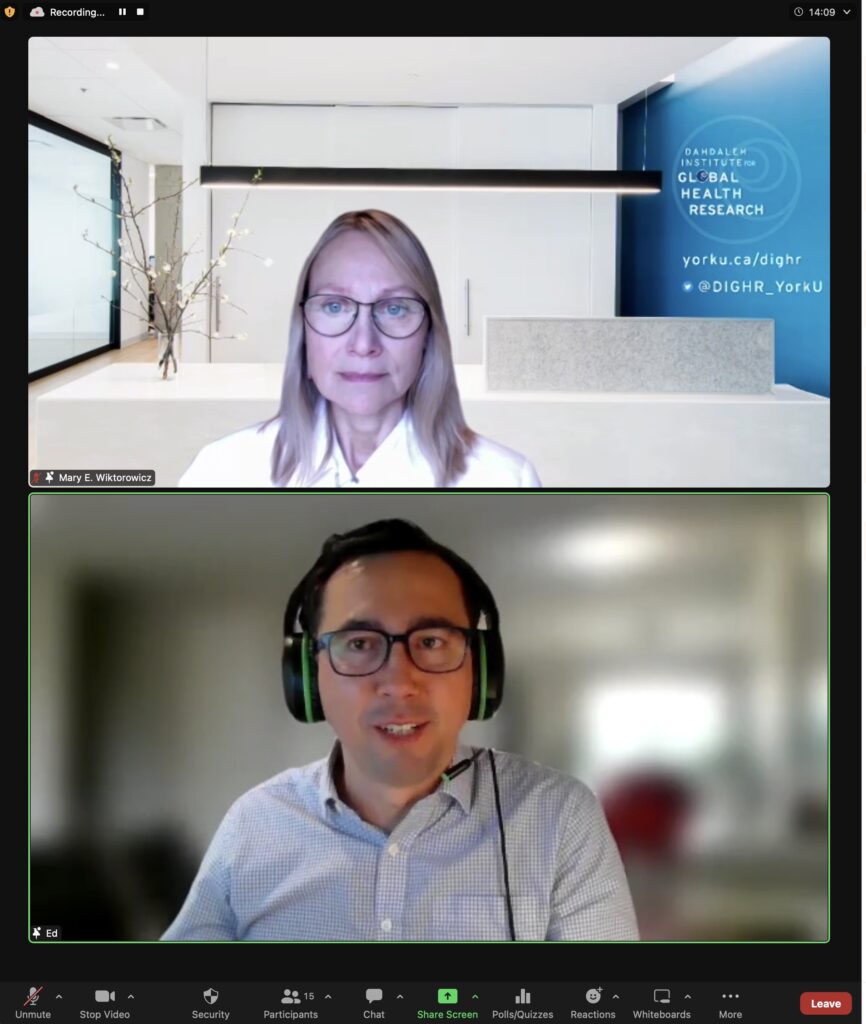Post
Published on May 10, 2023

In the final seminar of the 2022-2023 Dahdaleh Seminar Series, Eduardo Gallo-Cajiao and associate director Mary Wiktorowicz presented their recently published research on global governance for pandemic prevention and the wildlife trade.
Wildlife trade is a concern to public health and biodiversity conservation. However, a total ban on wildlife trade is neither feasible nor desirable, as many people depend on it for their livelihoods. As such, it is pivotal to consider conservation goals, trade, and livelihood objectives. The researchers posit that global health, food security, trade, and biodiversity conservation should be better coordinated as a strategy to prevent zoonotic spillover events. Further, as pandemic prevention often focuses more efforts on response after a zoonotic spillovers, rather than avoiding them in the first place, their research proposes to focus on prevention at source through governance macro-structures building on the Pandemic Treaty currently being negotiated under the World Health Organization.
Eduardo highlighted a few silo symptoms, which include lack of legally binding international agreements that prioritize both human health and biodiversity conservation. There are also governance gaps from institutions like CITES, OIE, and FAO, because they do not have a mandate to address zoonotic disease outbreak. Lastly, Eduardo mentioned the lack of cross-sectoral coordination between institutions, for example, WHO and CITES.
The Pandemic Treaty was proposed by Chile in April 2020. It has since garnered the support of 61 nations and moved into negotiations with the WHO. Accordingly, Eduardo and the research team propose four goals to include in the Pandemic Treaty. First, there is an imperative to improve risk understanding through the development of a policy-science platform, including the development of a framework for risk evaluation and monitoring. Second, such a framework should be adopted to evaluate zoonotic risk across the globe. Third, the assessment of zoonotic risk should be used to guide risk reduction accordingly. Fourth, a global pandemic financing facility should be established to support the previous three goals. The authors hope the WHO process will enshrine these goals in the Pandemic Treaty to prevent future pandemics by stopping zoonotic spillovers at their source.
Watch the seminar presentation below:
Connect with Mary Wiktorowicz
Themes | Global Health & Humanitarianism, Global Health Foresighting |
Status | Active |
Related Work |
N/A
|
Updates |
N/A
|
People |
You may also be interested in...
Recap – The Protection Gaps that Venezuelan LGBTQI+ Asylum Seekers Face in Brazil
On October 19, the Dahdaleh Institute for Global Health Research and the Centre for Research in Latin America and the Caribbean co-sponsored a seminar with Yvonne Su (faculty fellow) and Gerson Scheidweiler (postdoctoral fellow). Yvonne and ...Read more about this Post
Recap — It is Time to Rescue the Decolonization of Global Health Movement: The Pressing Need for a Shift in Paradigm, with Luchuo Engelbert Bain
On January 8, Dahdaleh research fellow Luchuo Engelbert Bain emphasized the urgent need for a paradigm shift to save the decolonization of the global health movement from stagnation and superficiality. Bain underscored that decolonizing global ...Read more about this Post
Recap — Global Insights on Equity in AMR Surveillance, with Mary Wiktorowicz
On November 20, Dahdaleh associate director Mary Wiktorowicz delved into the topic of equity in antimicrobial resistance (AMR) surveillance, offering insights into how equity can be embedded in global surveillance systems. The discussion emphasized equity ...Read more about this Post



